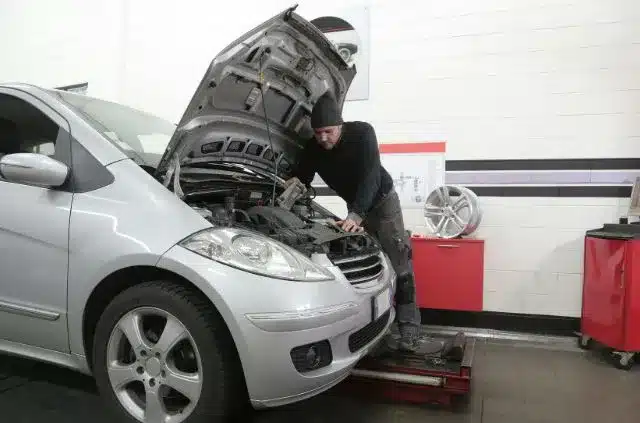The world of driving is changing fast as we move through the 2000s. New technology, what people want, and caring about the environment are all working together. They’re making roads smarter and much safer than before. Let’s look at how tomorrow’s highways will be different from today’s roads.
Smart Cars Are Taking Over
Cars are getting really smart these days. Companies that make vehicles want them to talk to everything around them. These new cars have special sensors that help them stay away from crashes without the driver doing anything. Car companies are spending lots of money on research. This means regular people can now buy these smart cars easier than ever.
Old cars in America create both problems and chances for new tech. Consumer Affairs says the average car or truck is now 12.5 years old. That’s pretty old! This means lots of people might want to upgrade their rides, perhaps even considering new car accessories to modernize their older vehicles. Adding smart features to older vehicles could make them last longer. It would also make driving safer for everyone.
How Drivers Are Becoming Supervisors
Smart cars will change what drivers do completely. Human mistakes cause most car accidents. But new features like cruise control that adjusts itself and systems that keep you in your lane are helping. Drivers are becoming more like managers instead of people who control everything. This shift toward smarter driving will prevent accidents and save lives.
Technology Makes Roads Safer
Technology leads the way in making roads safer. Scientists and engineers work on new ideas to stop crashes from happening. One big focus area involves intelligent transportation systems, or ITS for short. These systems let cars and roads talk to each other. Traffic lights can change based on real-time information. This prevents traffic jams and reduces accident chances.
Drunk driving remains a huge problem across the country. Colorado’s Department of Transportation reports over 26,000 arrests each year for drunk driving in their state alone. New solutions include alcohol sensors built right into cars. These systems won’t let drunk people start their vehicles. Communities are taking action to make roads safer by using this technology.
Smart Roads Work With Smart Cars
Advanced road technology also spots dangerous conditions. Ice on roads or bad weather gets detected automatically. Drivers can then make better choices about how to drive. Smart roads work together with smart cars to create safe travel. All these innovations are building a future where driving is smooth and secure.
The Changing Job Market for Drivers
The job market for road travel is changing too. Noregon reports that America needs about 3.5 million truck drivers. The shipping industry wants more drivers, but they also need people who understand modern technology. Trucks are getting autonomous features and smart systems. Drivers must learn these new technologies to stay good at their jobs.
Truck driving jobs are evolving alongside vehicle advances. Training programs now teach computer skills to drivers. They learn to use advanced GPS systems and safety features. This learning is important for keeping the shipping industry running well. Shipping moves most goods across America, so it’s really important to the economy.
Workers Must Adapt to New Technology
The need for truck drivers shows something bigger happening. Workers in transportation need to adapt to new technology. This means education and retraining programs are super important. They help drivers and safety workers learn skills for the new car world. Supporting these workers is key for road travel to keep growing safely.
Working Together for Better Transportation
Making road travel better depends on smart drivers and safer roads. Technology innovation, worker training, and caring for the environment all matter. Car makers, government officials, and regular people must work together. They need to create a clear plan for the future of transportation.
Using new technology while focusing on safety and the environment helps everyone. We get better travel experiences while protecting lives and the planet. The way forward means putting smart technology everywhere in transportation. When everyone commits to innovation, the future of road travel looks bright for individuals and all of society.
What Tomorrow’s Roads Will Look Like
Roads of tomorrow will be nothing like today’s roads. Cars that think for themselves will cruise down highways that communicate with everything. Traffic lights will adjust automatically based on real conditions. Drunk driving will become nearly impossible thanks to built-in alcohol sensors.
Workers in transportation are preparing for this revolution. Truck drivers learn computer skills alongside traditional driving techniques. Mechanics study electric engines and sensor systems. Everyone in the industry adapts to stay relevant in changing times.
Safety Gets Better Every Day
Safety improvements happen every day through research and development. Engineers test new ideas in laboratories and on test tracks. Government agencies create rules that encourage innovation while protecting people. Car companies compete to build the safest, smartest vehicles possible, ensuring peace of mind for even the longest road trips.
The environment benefits from these changes too. Smart cars use less fuel and create fewer emissions. Electric vehicles become more common each year, and improved battery life is a major factor in their increasing appeal. Traffic flows better, reducing time spent idling in jams.
Everyone Must Work Together
Success requires cooperation between many groups. Schools teach students about new transportation technology. Cities redesign roads to work with smart vehicles. Federal agencies fund research into safer driving systems.
This transformation affects everyone who travels. Families take safer trips to visit relatives. Businesses move goods more efficiently across long distances. Emergency vehicles reach people faster during crises.
The Endless Possibilities Ahead
Looking ahead, the possibilities seem endless. Cars might drive themselves completely within a few decades. Roads could charge electric vehicles while they drive. Traffic accidents might become extremely rare events.
The future of transportation depends on the choices we make today. Investing in smart technology pays off through saved lives and reduced accidents. Training workers for new jobs keeps the economy strong. Protecting the environment ensures healthy communities for generations to come, and this includes a renewed focus on comprehensive car care practices.



